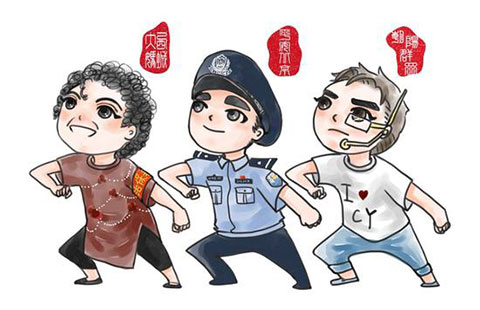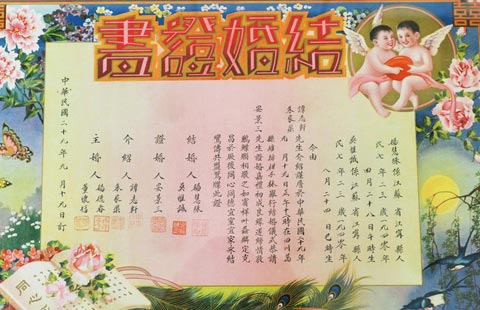China set for starring role in showbiz
Updated: 2015-08-22 05:07
By Sun Ye(China Daily)
|
||||||||
 |
|
The movie Hollywood Adventures was released by a Chinese company while scripted and directed by a Hollywood team. California-based East West Bank put up $13.5 million for the film production. PROVIDED TO CHINA DAILY |
In the movie Hollywood Adventures, shown in cinemas on the Chinese mainland in June, three ingenuous Chinese suddenly find themselves in a bewildering Hollywood. Fumbling through movie festivals and culture clashes, the trio make their way through the motion picture capital of the world with outrageous laughs.
But another type of very real foray into Hollywood is also underway. The burgeoning Chinese film industry is testing and exporting its influence, and these ventures, including overseas collaborations of unprecedented scale, are playing a key role in the market.
At the beginning of April, it took in 10 billion yuan ($1.56 billion) in less than 100 days. Growing at an annual rate of roughly 35 percent, it is poised to surpass the United States in box office receipts a few years to become the world’s biggest movie market. According to Beijing International Film Festival officials, last year more than 800 million Chinese moviegoers went to the cinema.
But for all the more than 500 domestic films and billions of yuan they brought in locally last year, only a small fraction of those films are seen overseas. Last year, Chinese films made a comparatively meager 1.8 billion yuan out of its homeland. In comparison, US movies’ domestic and international revenue, respectively, amounting to $10.3 billion and $14.6 billion in 2014, according to research by Entgroup, an entertainment market researcher.
The imbalance may begin to change, though.
“In the next 12 months, we’ll see a Chinese film that will sweep the world,” said Bennett Pozil, executive vice president at the California-based East West Bank, who has overseen financing for many Chinese pictures, from Crouching Tiger, Hidden Dragon by Ang Lee, and Hero by Zhang Yimou, to John Woo’s The Crossing and Skiptrace, which starred Jackie Chan.
Pozil saw how the 2000 film Crouching Tiger, Hidden Dragon introduced Chinese films to Americans and intrigued them. It’s still the largest-grossing foreign language film in the US by far.
“Another film at its level is coming along,” Pozil said. “The challenge is whether we can build on it.”
He is not the only one who thinks so.
“It’s not just a fantasy that in a year’s time, we will have a huge film of international influence,” said Ding Yaping, director of the Institute of Film and Teleplay at the Chinese National Academy of Arts.
Ding added: “It’s a natural outcome of the Chinese film market’s continual growth. But at the same time, it’s most likely to be a co-production project that involves contributions from different participants. It would come from an international setting.”
Such settings are becoming commonplace.
Take the film Hollywood Adventures. Released by Beijing Enlight Media, it was scripted and directed by a Hollywood team (Justin Lin of the Fast and Furious franchise is a producer). It starred three top Chinese actors and was filmed in California. The American East West Bank put up $13.5 million for production.
Beyond individual projects, international cooperation in different areas is coming along, too.
IMAX Corp, the Canadian company specializing in giant-screen technology, joined with CMC Capital Partners, a Chinese media and entertainment financial company, to set up a China Film Investment Fund in mid-June.
The fund was created to help produce high-quality Chinese films and promote them to the international market, according to Xinhua News Agency.
Hunan TV, one of China’s biggest broadcasters, in March entered an agreement with the Lionsgate film studio to invest $1.5 billion in co-productions in the next three years. The deal also allows each the use of the other’s massive distribution channels.
Shanghai-based Fosun International Ltd last year invested in Jeff Robinov’s Studio 8 in the hopes of acquiring “Hollywood’s advanced and sophisticated filmmaking expertise and technique, movie concept and technology, and complete production and publication systems” for the China market, according to a company statement.
Huayi Brothers Media Corp and Bona Film Group bought China Lion Film Distribution in 2011 to gain access to the North American market.
And the list goes on.
Such collaboration doesn’t just mean entry to Hollywood and learning opportunities for Chinese. It works both ways.
“Hollywood always searches for revenue, so if you look at studio trends you’ll see Hollywood running toward one item (in a certain period) all the time. Now the item is China,” said Pozil. The East West Bank has also financed the Hunan TV-Lionsgate deal.
“What we focus on is relationships. We don’t pick the projects, we pick the relationships,” Pozil said, explaining their success in focusing on the Chinese film market.
“The Chinese film industry has stepped into the age of international financial capital,” said Ding, the film industry expert. “When combined with the force of the Internet, it’s natural to expect the influence of Chinese film to grow in the international arena.”
That said, there are still difficulties ahead for Chinese film to reach the global acceptance it craves.
The Institute of Film and Teleplay started a three-year national research project in 2013 on strategies for Chinese films to extend their reach abroad. It recently finished a survey on overseas audiences for Chinese films.
“In the age in which Internet thinking prevails, we should first examine the audience to see what it is that they hope to see,” said Ding, who heads the study, in response to China Daily.
Some 300 people were surveyed, most in the target audience age range of 20 to 30. The study found that though Chinese films are well liked, it’s the kung fu pictures and historical films that draw the most attention, even though pictures of other genres are available.
Moreover, for youngsters, going to the movies is becoming outdated, given that the majority (60 percent) see Chinese films online. They have a big interest in the culture behind the films, but they don’t always find what they’re looking for. Chinese films often deter them with language and a storytelling logic unfamiliar to them, Ding explained.
“This shows how a movie going out to an international audience should appeal to them,” Ding said. “The story has to be good, but the narratives should also have an acceptable logic.
“Besides, for Chinese films to gain international acceptance, perhaps it’s time to get over the cinema release model now that the Internet has taken over,” Ding said.
“If you stand in the viewer’s shoes, and design practical ways to appeal to and communicate with him, it’s much easier to have your film accepted overseas,” Ding said. “After all, it’s always customers first.”
Movies often are the most effective vehicles to transmit a culture. As China tries to export its cultural influence, it is promoting its films through participation in international festivals, screenings and similar events.
Last year alone, 345 Chinese films were entered in various international film festivals. More than 450 Chinese films were shown overseas last year at China-themed screening events. These contributed to overseas revenue growth of around 30 percent, according to a report by Entgroup.
“The ‘going-out’ enterprise has borne fruit, but it lags behind the giant domestic market. That’s why we will continue to work very hard in the coming years to amp up its influence,” Ding said. “Keep up the momentum, and we will be impressed with China’s image overseas.”
Contact the writer at sunye@chinadaily.com.cn
- Tsipras formally resigns, requesting snap general elections
- China-Russia drill not targeting 3rd party
- UK, France boost security
- China demands Japan face history after Abe's wife visits Yasukuni Shrine
- DPRK deploys more fire units to frontlines with ROK
- DPRK, ROK trade artillery, rocket fire at border

 Across America over the week (Aug 14 - Aug 20)
Across America over the week (Aug 14 - Aug 20)
 Stars in their eyes: leaders in love
Stars in their eyes: leaders in love
 A survival guide for singles on Chinese Valentine’s Day
A survival guide for singles on Chinese Valentine’s Day
 Beijing police publishes cartoon images of residents who tip off police
Beijing police publishes cartoon images of residents who tip off police
 Rare brown panda grows up in NW China
Rare brown panda grows up in NW China
 Putin rides to bottom of Black Sea
Putin rides to bottom of Black Sea
 The changing looks of Beijing before V Day parade
The changing looks of Beijing before V Day parade
 Nanjing displays ancient marriage, divorce certificates
Nanjing displays ancient marriage, divorce certificates
Most Viewed
Editor's Picks

|

|

|

|

|

|
Today's Top News
Emissions data won't change China policy
Preparations shutter Forbidden City, other major tourist spots
President Xi Jinping calls for crews not to ease up
Chemical plants to be relocated in blast zone
Asian sprinters on track to make some big strides
Jon Bon Jovi sings in Mandarin for Chinese Valentine's Day
Tsipras formally resigns, requesting snap general elections
DPRK deploys more fire units to frontlines with ROK
US Weekly

|

|







